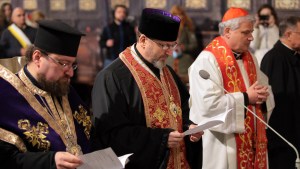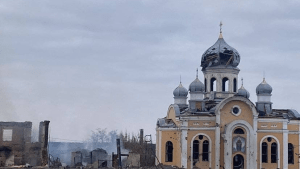As the Russian invasion of Ukraine intensifies, many people around the world are experiencing growing fear. Speculation is rife over how the conflict might be resolved, the media highlight the risk of nuclear war, there’s concern for the future of the world. This fear is often expressed on social networks with the hashtag #WorldWarIII. If we’re not careful, our fear — a legitimate emotion — can become pervasive in our lives.
But the Bible urges us not to be afraid. The expression “Do not be afraid” is repeated 365 times. Here are a few suggestions that can be useful in order to avoid becoming overwhelmed, inspired in part by Fr. Nikolaas Sintobin, “Web Pastor” of the Jesuit community in Amsterdam, who has written about fear in the context of the COVID-19 pandemic.
The first step in breaking the spiral of anxiety is to talk about it—to a trusted person, not publicly on social networks. Indeed, on the internet, you don’t know who will answer you, and some people tend to foster fear, not calm it.
According to St. Ignatius, fear grows more in the secret of one’s heart. Expressing your fear to someone you trust allows you to externalize it. This is a way to unburden yourself and to break the vicious circle of fear feeding on itself.
2BE WELL INFORMED
A great deal of “fake news” is circulating on the internet. Especially in times of war, information can be inaccurate or manipulated for propaganda. Therefore, it’s important to choose your information sources carefully and to critically examine the facts. When the facts are confused or incorrect, we can draw false conclusions and our fears can be fueled without foundation.
3REDUCE THE TIME YOU SPEND ON SOCIAL MEDIA
As the hashtag #WorldWarIII currently trending on Twitter proves, social networks contribute with the force of algorithms to create an anxiety-provoking climate, all the more so when you spend hours online. If you can’t do without social media, make sure you check who you are listening to and why.
4ACCEPT THE FACTS BUT LOOK FOR REASONS FOR CONFIDENCE
This is what St. Ignatius calls the deception of fear. “The power of fear lies above all in the conviction that fear is justified. Fear knows how to present subtle and relevant arguments like no one else. They are designed to reinforce the credibility of fear. We honestly believe that we are right to feel anxious. After all, these arguments prove that we have no choice but to be afraid. This is exactly where the deception of fear lies,” Fr. Sintobin explains. He continues:
“Often it is true that what we fear will actually happen. But you don’t have to be afraid of it. We can face the problems. That’s what we do from morning to night.”
In other words, we need to take into account not only the facts that incline us to fear, but also the reasons we have for confidence. For Christians, this includes Jesus’ words in John 16:33 – “I have said this to you, so that in me you may have peace. In the world you face persecution. But take courage; I have conquered the world!”
5LIVE IN THE PRESENT
We need to remember Our Lord’s words: “So do not worry about tomorrow, for tomorrow will bring worries of its own. Today’s trouble is enough for today.” Why should we be afraid of a war that we are not sure, at the moment, will cross the borders of Ukraine? Projecting apocalyptic scenarios doesn’t help. It simply amplifies our fear and plunges us deeper into anxiety. The fear of a future that does not yet exist prevents us from living fully in the present that does exist.
6JOIN TOGETHER TO PROMOTE PEACE
Whether it is through prayer, fraternal dialogue, volunteering, charitable activities, or fasting, there are many ways of uniting and putting ourselves at the service of peace. In this way, instead of letting our fear or panic grow, we’re doing something active to counteract it.
7TRUST IN GOD
“Prayer casts out all fear,” Pope Francis said at the general audience on February 27, 2019. “The first step in Christian prayer is consigning ourselves to God, to his providence.” Trusting in God’s mercy, relying on God, is a good way to free oneself from fear: “It seems to me that you should resolve to do with calm what you can. Do not be anxious about everything, but leave to Divine Providence what you cannot accomplish by yourself,” wrote St. Ignatius.
Since the beginning of the Russian offensive, there has been no lack of prayer initiatives. For instance, the pope called for a “Day of Fasting for Peace” in Ukraine on Wednesday, March 2: “To the diabolical absurdity of violence, we respond with the weapons of God, with prayer and fasting,” the pope said.
8SOME PRAYERS OF SURRENDER
Another way of trusting God, and really believing in him, is to regularly raise short prayers to him such as “Jesus, I trust in you, Jesus, I trust in you” (Claude de la Colombière) or this verse from the psalm: “Protect me, O God, for in you I take refuge” (Ps. 16).
These prayers of abandonment by the great saints also offer great comfort, insofar as they invite us to unburden ourselves of all our worries and to rejoice in the love of God, who alone is sufficient.
The “Suscipe” prayer of St. Ignatius of Loyola:
Take, Lord, receive all my liberty,my memory, my understanding,and my entire will,All I have and call my own. You have given all to me. To you, Lord, I return it. Everything is yours; do with it what you will. Give me only your love and your grace, that is enough for me.
This famous prayer of St. Teresa of Avila:
“Let nothing disturb you,
Let nothing frighten you,
All things are passing away:
God never changes.
Patience obtains all things.
Whoever has God lacks nothing;
God alone suffices.”
“Let nothing trouble you,
let nothing frighten you;
everything passes away.
God does not change:
patience obtains everything;
he who has God
lacks nothing
God alone is enough!
This prayer of St. Claude de la Colombière:
My God, I am so convinced that you keep watch over those who hope in You, and that we can want for nothing when we look for all in You, that I am resolved in the future to live free from every care, and to turn all my anxieties over to You. “In peace, in the selfsame, I will sleep and I will rest, for Thou, O Lord, singularly has settled me in hope.” (Ps 4: 9-10)
Men may deprive me of possessions and of honor; sickness may strip me of strength and the means of serving You. I may even lose Your grace by sin; but I shall never lose my hope. I shall keep it to the last moment of my life; and at that moment all the demons in hell will strive to tear it from me in vain. “In peace, in the selfsame, I will sleep and I will rest.”
Others may look for happiness from their wealth or their talents; others may rest on the innocence of their life, or the severity of their penance, or the amount of their alms, or the fervor of their prayers. “Thou, O Lord, singularly hast settled me in hope.” As for me, Lord, all my confidence is confidence itself. This confidence has never deceived anyone. No one, no one who has hoped in the Lord has been confounded!



